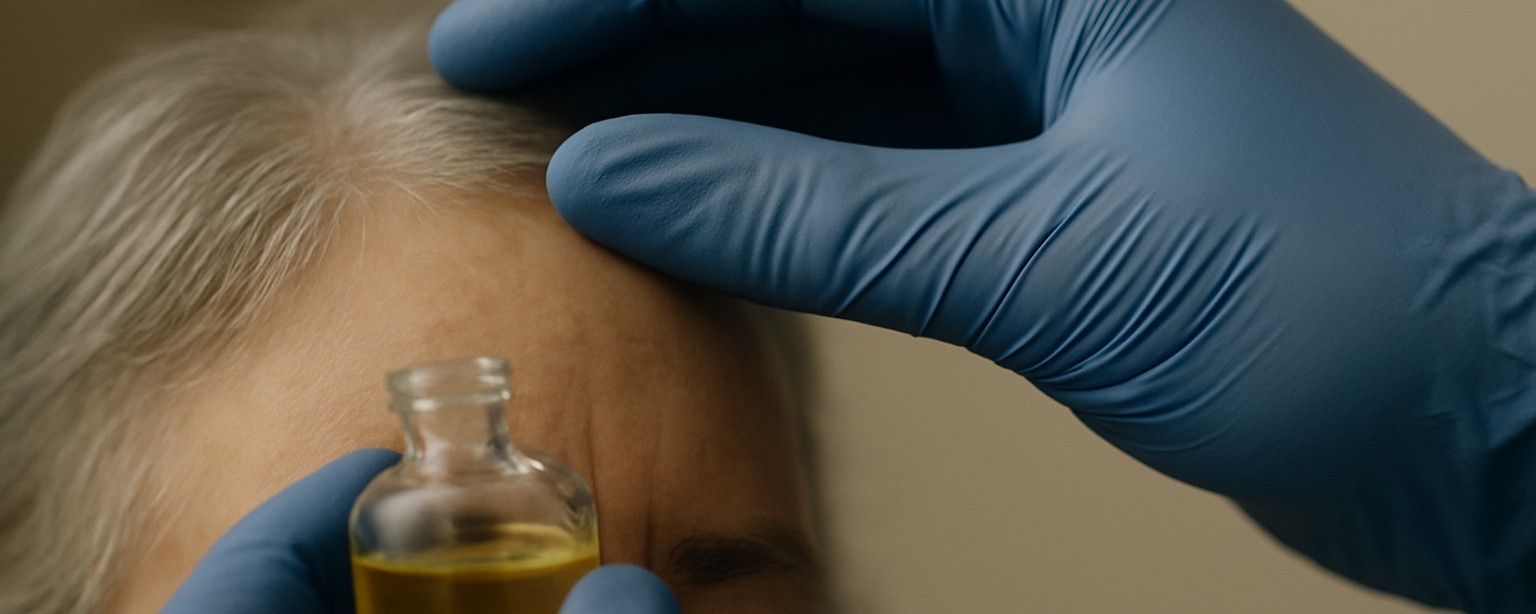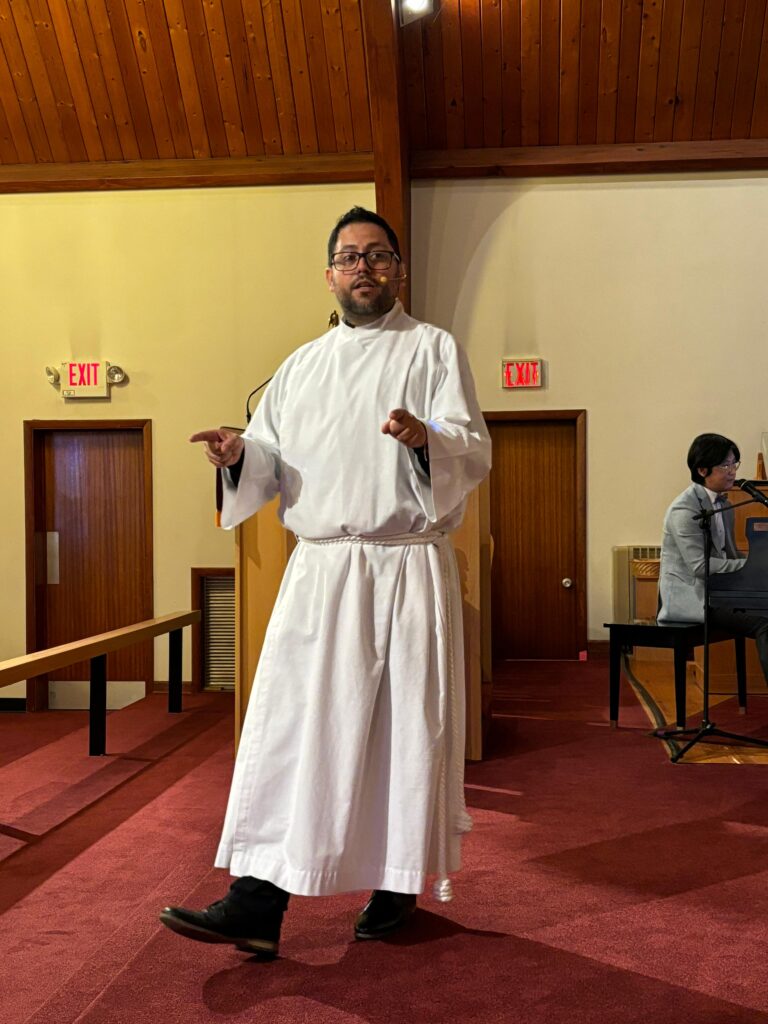
I don’t like hospitals, and it seems paradoxical that a place where you can receive so much help, even have your life saved, can provoke so much rejection in a person who finds themselves confined to them. And yet, there she was, her gray hair framing a fragile face. She lay in that bed illuminated by a strange blend of light, the warm yellow glow of the wall lamp mingling with the summer sun sneaking through the curtains of the hospice area. I had been here several times before, always in my dark suit, always wearing the plastic badge clipped to my lapel, a small black-and-white print of my face beside a name that sounds somewhere between local and foreign.
That afternoon I struggled with surgery gloves that were clearly one size too small, fumbling and losing precious minutes before I could step into what I consider a sacred space: the room where Ann’s restless soul lingered inside a body that once ran, laughed, and dreamed.
I had been told many times that Ann was once robust, her laughter filling any room she entered. She never arrived at the small Methodist church in town without her freshly baked pecan pie, the kind of contribution that nourished not only bodies but also the spirit of fellowship. She and her beloved Bob had built, with their very own hands, the house where I live today. Wide windows, generous light, walls adorned with colorful paintings, shelves filled with books on the history of slavery and liberation in the United States, volumes of theology that, not too many decades ago, might have been unthinkable in this very community.
But now, Ann was warm to the touch, yet already at the threshold of eternity. I suspected she was waiting. Expectant. Then, I began my ministry to her by consulting the little black book I had received as a gift after completing my internship at the end of my Master of Divinity studies at Drew University, from the Methodist home community that had embraced me. That church had welcomed me, loved me, received me into membership, and blessed me as one of their own sons when I began my journey into ordained ministry in the United Methodist Connection.
I still remember the phone call that set everything in motion years earlier, when I was living in Bogotá. I was driving my little red car through the chaos of the city, the neon lights of the north side flickering in my windshield, my evenings filled with passengers, my nights occupied as an Uber driver. The earnings were just enough to cover rent and books. But my real sustenance came from ministry. I was shepherding a small, non-conventional community of young adults, gathering in noisy cafés and dim apartments to speak about Jesus in a city that often tried to crush hope.
That evening, while horns blared and pedestrians hurried through crosswalks, my phone rang. A beloved friend’s voice came through the line: “David, why don’t you come to study the Master of Divinity here in the United States? There is a great need for ministers. Your pastoral gifts could bring something new to the mission here.” Her words surprised me, but they didn’t feel foreign. Deep inside, I knew she was right.
So, I packed my life into two suitcases and one carry-on. Everything I owned came with me on that trip that would eventually carry me to Ann’s bedside on that sweltering summer afternoon. And as I pressed my olive-oil-soaked fingertips against her forehead, tracing the shape of a cross over her silver hair, I remembered that every journey has a purpose. Mine had led me here, into the quiet intersection where two souls meet: hers, ready to encounter her Lord, and mine, carrying a fragment of balm from Galilee.

People sometimes complain to me about apportionments, about the funds that flow out from local churches into the larger mission of the denomination. I always listen with patience and a smile. I understand their reasons. But in moments like that one with Ann, I cannot help but remember: it was through those very apportionments that the Church invested in me. They paid for my education. They supported me through my first years in a new land. They believed in my ministry and appointed me to serve as a local pastor in a mission that holds its doors, minds, and hearts open.
Many don’t believe me when I tell them that I arrived here with only a handful of dollars in my pocket and a letter in my bag. It was written by my friends from an International Mission based in New York, a letter filled with promises that Jesus himself faithfully fulfilled, word by word.
It is never easy to arrive in a new place with your culture, your convictions, your dances, and your taste for sweet plantains. It is harder still in a land where another language dominates, where the music is different, and where loneliness can grow in silence. Yet along the way, I found what is universal: a smile, an embrace, a compassionate glance.
The Body of Christ, Apostle Paul reminds us, is multiform. Some sow, others water, but it is God who gives the growth. And so, Ann was enjoying the fruits of that growth when I held her hand gently and dipped her finger into the grape juice that touched her lips in the Sacrament of Holy Communion, receiving the blood of Christ. In that moment, I saw her smile. Perhaps she didn’t, but I insist: I saw it.
A dear colleague once told me that salvation is healing. That afternoon, I witnessed it. Healing is not always about breath returning to lungs or strength to muscles. Healing is also the soul at peace, ready to let go, ready to meet the One who calls us beloved. I saw salvation touch Ann as surely as the oil on her forehead, as surely as the bread and juice on her lips.
I will never forget her face or her story. And in the midst of so much noise about what countries like Colombia export to countries like this nation, whenever someone asks me about it, I answer without hesitation: Salvation.
Note: This story is based on real events. The names have been changed to protect the privacy of those involved.
